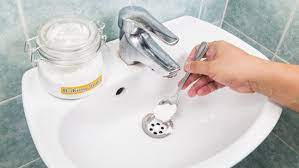Baking soda (a base substance) and vinegar (an acid) react to create a bubbling action that can break free light stoppages. This method works best if there’s no standing water in the sink, to allow the reaction to reach the clog.
To try this, pour one-half cup of salt down the drain, followed by boiling water. Repeat if necessary, before calling a plumber. Https://www.fixitrightplumbing.com.au/plumber-melbourne/ is a great website to reference if you do need plumbing assistance.
Baking Soda
Baking soda (sodium bicarbonate) is a pantry staple that can clean dishes, zap stinky odors and unclog drains. Its basic nature can dissolve mineral deposits and organic material like grease. It also has slight disinfectant properties that fight odor causing bacteria and fungus. Pour a cup of baking soda down the drain followed by a cup of boiling water to create a chemical reaction that loosens clogs and flushes them from your pipes.
For a tougher clog, mix 1/2 cup of baking soda with a cup of salt and dump the mixture down your sink drain. Let it fizz and work its magic for a few hours before clearing the drain with a pot of boiling water. This technique works best on kitchen sink clogs caused by food stuck at the curve of your drain pipe. This method is more effective than traditional chemical drain cleaners and safer for your pipes. But you may still want to call a plumber for a serious clog.
Boiling Water
A simple pot of boiling water may be all you need to clear your clogged drain. Pour a cup of hot water down the drain and let it sit for an hour. The hot water softens the clog and flushes away residue. If your clog is particularly stubborn, you can also mix a paste of baking soda and vinegar for an effective and natural alternative to harsh chemical drain cleaners.
For a tough kitchen clog, try mixing equal parts of salt and baking soda. This combination creates a fizzing reaction that breaks apart food and grime. The mixture also eliminates foul odors in your kitchen sink. Let the mixture sit for at least an hour and leave it overnight if necessary. Flush it with hot water in the morning and your sink should be free of clogs. Be careful not to overdo it with the salt because too much can damage your pipes. Pour the salt and baking soda in small increments to prevent scalding.
Vinegar
Almost every homemaker knows that pouring baking soda and vinegar down the drain will cause a fizzing reaction. It is a simple way to break down soap scum and grease. This combination will also dissolve hair and gunk that can clog pipes.
Vinegar is an acidic substance, which makes it very effective at dissolving organic build-up in household drains. It is non-corrosive and will not damage pipes or septic
systems. It also has a mild fragrance that will help eliminate unpleasant smells.
To use this solution, clear out the area around the drain. Then, place 1/2 cup of baking soda and 1/2 cup of vinegar down the drain. Plug the drain and let it sit for an hour or overnight if it is a very tough clog. After an hour, pour a pot of boiling water down the drain to rinse away all the ingredients. Repeat as needed. If you don’t have any vinegar on hand, try using lemon juice instead. It works similarly to vinegar but is less harsh and has a pleasant lemony aroma.
Salt
Sodium chloride is an abrasive substance that removes debris from sink drains. It also has antibacterial properties, killing germs by dehydrating them.
Over time, hairs from shaving, bits of food, and other small items that get rinsed down the drain begin to cling together, creating obstructions along plumbing passageways. These clumps of debris block the flow of water and result in a slow drain.
Home remedy recipes for unclogging a drain often involve baking soda and salt. This mixture is effective on minor clogs, but the results will be less impressive on major ones.
For large clogs, try mixing baking soda and cream of tartar in a sealed jar before pouring the solution down the drain. Baking soda eliminates odors and breaks up tough clogs, while cream of tartar cleans metal pipes from any lingering residue.
After waiting a few hours, flush the drain with boiling water to examine whether it has cleared. If it hasn’t, repeat the process or try one of the following methods.


Leave a comment